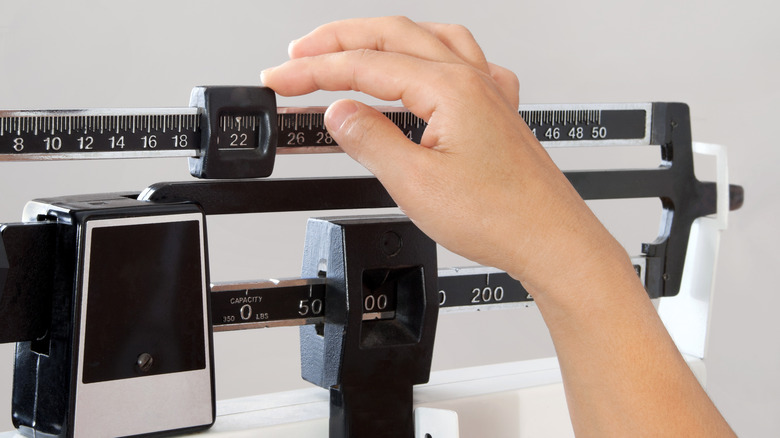Why Doctors Feel New Federal Weight Loss Guidance Might Hurt Women More Than It Helps
Stepping on the scale at the doctor's office can be stressful for some. If you have a history of disordered eating, experience weight stigma, or have anxiety around body image, talking about your weight at doctor's appointments can be triggering and unhelpful. Now, new guidance from the federally funded Women's Preventive Services Initiative recommends that doctors counsel women between the ages of 40 and 60 on their body size. The goal is to reduce their risk of obesity and related health conditions (via Annals of Internal Medicine).
It's common for women to gain weight in midlife, according to the Cleveland Clinic. This is often due to a decrease in estrogen in the years leading up to menopause, which slows our metabolism, but obesity is about more than just weight gain. It's calculated using body mass index (BMI), which attempts to determine body fat using your height and weight (via the International Journal of Obesity). The only problem is that the BMI doesn't differentiate between muscle mass and body fat, leading to potential misclassifications. It also doesn't take into account other factors that determine health, such as a person's genetics, biological sex, and lifestyle (via NBC News).
While obesity has been linked to conditions like hypertension, heart disease, stroke, diabetes, and some cancers, using BMI to determine whether or not a person is obese could be flawed from the start. While counseling middle-aged women on weight loss sounds productive, what if it hurts more than it helps?
The potential harm of weight loss counseling
The new recommendations suggest that BMI should be calculated for all women receiving routine care (via NBC News). All women who are normal or overweight should be counseled on healthy eating and physical activity in order to maintain weight or avoid obesity.
However, some doctors and patients are concerned that focusing on weight could cause women to develop anxiety and stress. They may also avoid doctor's appointments, go to dangerous extremes to lose weight, or develop an eating disorder. For those who already experience an eating disorder or are in recovery, this focus on weight could have disastrous effects. Common triggers for those with eating disorders include stepping on a scale and having conversations about weight loss, which can lead to continued disordered behaviors (via The Emily Project). Because anorexia — a type of eating disorder — is considered the most fatal psychiatric diagnosis, this should be given special attention (via WebMD).
The recommendations are based on a review of trials that found that counseling proved effective in helping women lose between 1.9 pounds and 5.5 pounds (via NBC News). Dr. Kimberly Gregory, professor of obstetrics and gynecology at Cedars-Sinai Medical Center and co-author of the new guidance, says that their aim is to help women prevent serious illness — not to make them feel embarrassed or uncomfortable about their weight.


